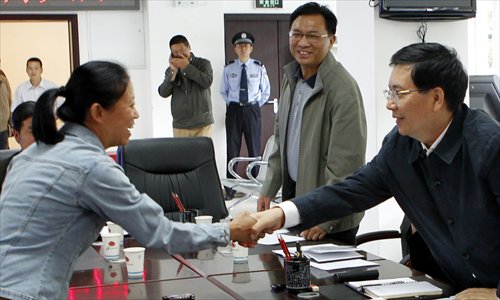Petition studies becomes popular at universities but system failing

Qin Guangrong (right), former Party chief of Yunnan Province, meets a petitioner at the local office of letters and calls in Kunming on April 30. Photo: CFP
Peng Cong, a postgraduate student enrolled in the China University of Political Science and Law (CUPL) in September this year, never expected one of his supervisors be Zhang Zonglin, deputy director of the office of letters and calls in Beijing.
"He looked different from how I imagined officials," said Peng.
Peng is the first student at the university to take this major.
Petitioning, also known as letters and calls in China, is the administrative system for hearing public complaints and grievances. Traditionally, it's used to circumvent the often corrupt or incompetent local authorities and reach a higher level of government. But the success rate is very low, and for many, petitioning can take years. Since petitions reaching the central government may influence the image of local officials, huge amounts of manpower are illegally used to block petitioners, including stationing police at train stations to arrest "troublemakers" on their way to other cities.
The Beijing Institute of Letters to Government, set up by Peng's government supervisor in 2009, is the first institution for analyzing and researching social contradictions and problems reflected in the national petition system.
But while the major is becoming more popular, problems in the system remain rampant.
A popular course
The Beijing City University began to grant students master's degree on petition system studies in September 2012, graduating the first bunch of 12 students this July.
Shen Yan is one of them. She is now employed at the petition office at a grassroots government in Beijing. "I [chose the course because I] wanted to know where the center of social problems and contradictions is and how to solve them. My major helps me familiarize with the basic communication skills and job routine," Shen explained.
Tianjin University, Zhongnan University of Economics and Law (ZUEL), Suzhou University and Southwest University have also opened courses on China's petition system in undergraduate studies.
"Our school has opened a selective course on legal education on letters and calls system in 2013. The course is very popular among students and attracts about 80 students every year," said Zhang Hong, vice dean at law school with ZUEL.
According to Zhang, the course offers strategies for dealing with "contradictions" in petitioning work. He did not give further details.
Beijing Union University is scheduled to welcome its first batch of students on petition studies in September 2015. Renmin University of China is also considering setting up a doctorate program.
A long-standing problem
Zheng Guangmiao, director of the Beijing Institute of Letters to Government, admitted that the nation's petition system has been a long-existing problem in China that often ignited conflicts; hence there is a rising demand to promote professional officials who are capable of handling petition cases.
Many complaints are filed each year in China, generally around disputes in land acquisition, social security, education, healthcare or environmental pollution.
The system is often contentious. In February 2013, a Beijing court sentenced 10 men for illegally detaining petitioners from Yuzhou, Hunan Province in an improvised jail in Beijing. In a separate case, a petitioner from Hunan was investigated for intentional assault in January, after he stabbed two people who tried to prevent him from reaching the petition office in Beijing.
As petitioners are usually victims of injustice, some may take advantage of the system to impose pressure on local governments to gain private interests.
Xin Ming, a professor with the Party School of the Communist Party of China Central Committee, said that the petition system has long been a very important channel for the public to vent their grievances.
"However, as the number of petitioners was once considered a gauge to evaluate the performance of local governments, some local officials try what they can to stop petitioners from lodging a complaint to a superior authority, a disgrace for the originating place's government," Yan Jirong, a professor with Peking University's School of Government, said.
A long way to go
"Petitioning is an outcome of the 'rule of man' and a phenomenon against the rule of law," Hu Xingdou, a professor at Beijing Institute of Technology, told the Global Times.
"The set-up of the courses on the petitioning topic reflected social demands and should teach students wide range of legal policies," said Hu, adding that such courses should allow the students to learn how to receive petitioners and solve their problems through legal approaches.
China should scrap the petitioning system and take the road of the rule of law. Political reform should be conducted to gradually enhance people's belief on laws and improve the current situation of legal justice, Hu noted.
Xie Zhiyong, a law professor with the CUPL, told the Global Times that "the current petitioning system cannot truly solve the petitioners' problems."
It is a doomed system as its working procedure is a paradox, according to Xie. He added that one way to solve the problem is to redesign a new system, which could be discussed at universities.
"Students who study on this topic should first learn about the historical development of petitioning to see if it is necessary to maintain this system and then conduct practical research," Xie added.
China's State Bureau for Letters and Calls in February released guidelines on reforming the petition system, stipulating that petition cases should be diverted to courts if they involve lawsuits, and government policy and decision-making will become more transparent and enlist more public participation.
The bureau issued a regulation on Thursday, stipulating that the evaluation of the public's degree of satisfaction will be included into the working performance of the staff. Any malpractices that caused dissatisfaction of the public will be punished.
The regulation will take effect from January 1, 2015.
Newspaper headline: Last appeal